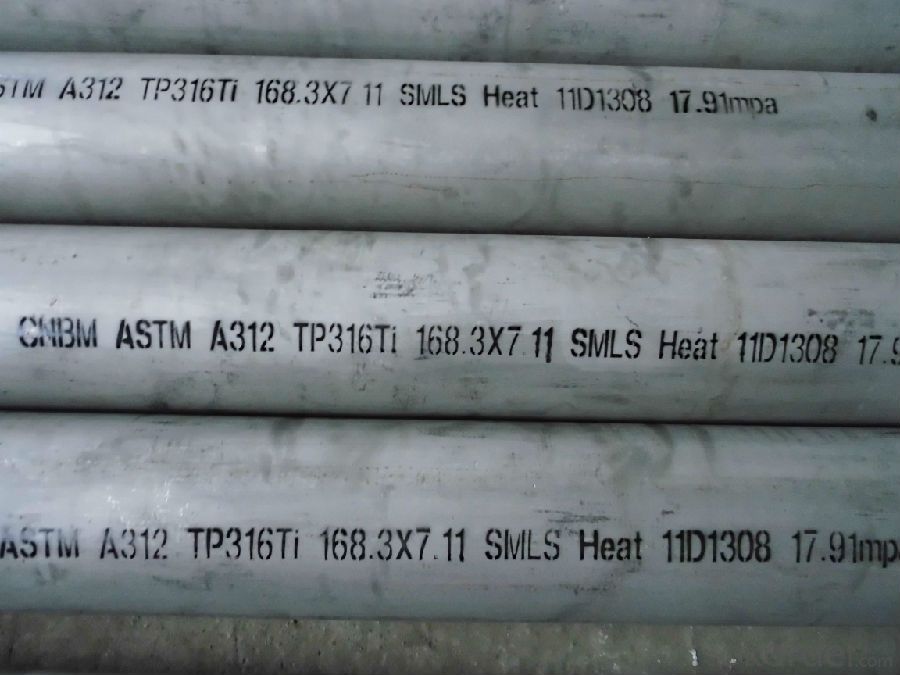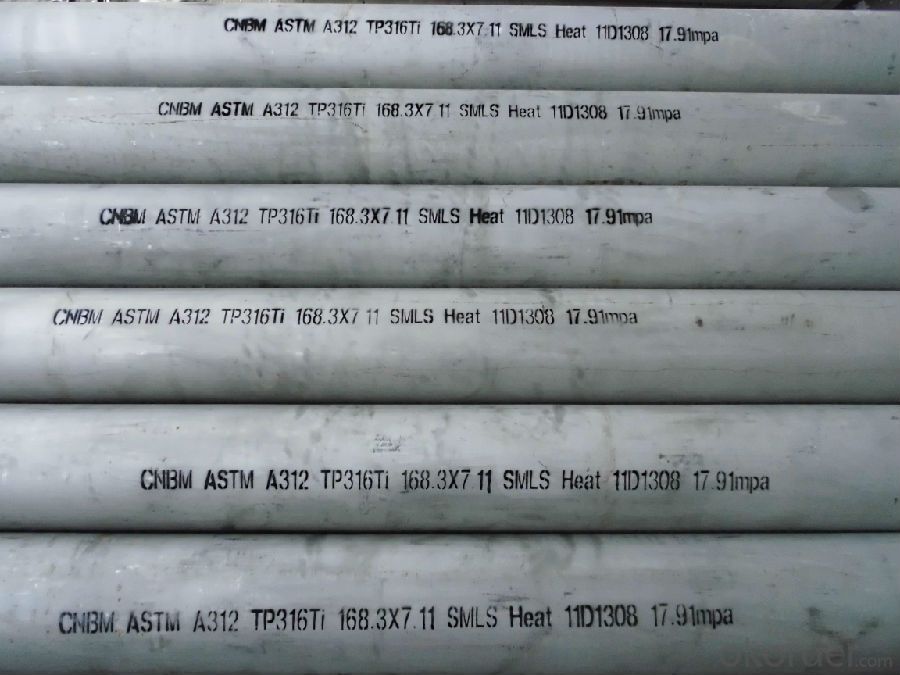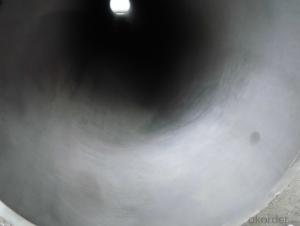Stainless steel pipe
- Loading Port:
- China Main Port
- Payment Terms:
- TT OR LC
- Min Order Qty:
- -
- Supply Capability:
- -
OKorder Service Pledge
OKorder Financial Service
You Might Also Like
316Ti stainless steel plate is the addition of Ti in SUS316 steel can improve the resistance to intergranular corrosion resistance.


The chemical composition of 316Ti stainless steel:
C (%): less than 0.08
Si (%): less than 1
Mn (%): less than 2
P (%) is less than or equal to: 0.045
S (%) is less than or equal to 0.03
Cr (%): 16 ~ 18
Ni (%): 10 ~ 14
Mo (%): 2 ~ 3
other (%):
5 (C+N) = Ti = 0.70, N = 0.10
The mechanical properties of 316Ti stainless steel:
YS (Mpa) = 205 TS (Mpa) = 520 EL (%) is more than or equal to 40 Hv 200 degrees
- Q:Are steel pipes resistant to fire?
- Yes, steel pipes are highly resistant to fire.
- Q:How are steel pipes used in the telecommunications infrastructure?
- Steel pipes are used in the telecommunications infrastructure primarily for underground cable installation. They serve as protective conduits that house and secure the fiber optic cables, providing a reliable and durable solution for long-distance communication.
- Q:What are the different grades of steel pipes?
- There are several different grades of steel pipes, including carbon steel, stainless steel, and alloy steel. Each grade has its own unique properties and is used for specific applications based on factors such as strength, corrosion resistance, and temperature resistance.
- Q:What are the different coatings used on steel pipes?
- There are several different coatings used on steel pipes, including epoxy coatings, polyethylene coatings, zinc coatings, and fusion bonded epoxy coatings. These coatings are applied to protect the steel pipes from corrosion and extend their lifespan.
- Q:What is the difference between internal and external coating of steel pipes?
- The main difference between internal and external coating of steel pipes lies in the purpose and location of the coatings. The internal coating is applied on the inner surface of the steel pipe to protect it from corrosion and ensure smooth flow of the contents within the pipe. It is commonly used to prevent contamination of the transported liquid or gas and to extend the lifespan of the pipe. On the other hand, the external coating is applied on the outer surface of the steel pipe to protect it from environmental factors such as moisture, chemicals, and physical damage. It helps to prevent corrosion and maintain the structural integrity of the pipe, especially in harsh conditions. Overall, while the internal coating focuses on the functionality and preservation of the transported contents, the external coating primarily aims at safeguarding the pipe itself from external influences.
- Q:What is the difference between steel pipe and HDPE pipe?
- Steel pipe and HDPE pipe are two different types of pipes that are used for various applications. The main difference between steel pipe and HDPE pipe lies in their composition and characteristics. Steel pipe, as the name suggests, is made of steel and is a strong and durable pipe material. It is commonly used in industrial applications and infrastructure projects where high strength and reliability are required. Steel pipes are known for their ability to withstand high pressure, temperature, and heavy loads. They are also resistant to corrosion, making them suitable for both above-ground and underground installations. On the other hand, HDPE (high-density polyethylene) pipe is made of a plastic polymer called polyethylene. HDPE pipes are lightweight, flexible, and easy to install, making them ideal for various applications such as water supply, drainage systems, and agricultural irrigation. They are resistant to chemicals, abrasion, and UV rays, making them suitable for both indoor and outdoor use. HDPE pipes are also known for their long service life and low maintenance requirements. In terms of cost, steel pipes are generally more expensive than HDPE pipes due to the raw material cost and manufacturing process involved. However, steel pipes are often chosen for their superior strength and durability, especially in applications where high pressure or extreme conditions are involved. HDPE pipes, on the other hand, offer a cost-effective solution for applications that do not require the same level of strength and durability as steel pipes. In summary, the main differences between steel pipe and HDPE pipe lie in their composition, strength, durability, and cost. Steel pipe is known for its strength and reliability, while HDPE pipe offers flexibility, ease of installation, and resistance to chemicals and UV rays. The choice between the two depends on the specific application and requirements of the project.
- Q:How are steel pipes used in the manufacturing of agricultural machinery?
- Steel pipes are commonly used in the manufacturing of agricultural machinery for various purposes such as structural support, fluid transportation, and hydraulic systems. They provide durability and strength to the machinery, allowing it to withstand the heavy loads and harsh conditions associated with agricultural activities. Additionally, steel pipes are often used to create the framework and chassis of the machinery, ensuring its stability and longevity in the field.
- Q:What are the different methods of testing steel pipes?
- There are several methods of testing steel pipes, including non-destructive testing methods such as ultrasonic testing, magnetic particle testing, liquid penetrant testing, and radiographic testing. Destructive testing methods like tensile testing, bend testing, and impact testing can also be used to assess the strength and integrity of steel pipes.
- Q:Can steel pipes be used for underground steam pipelines?
- Yes, steel pipes can be used for underground steam pipelines. Steel pipes are commonly used for various types of pipelines, including steam pipelines, due to their strong and durable nature. Steel pipes have the ability to withstand high temperatures and pressures, making them suitable for transporting steam underground. Additionally, steel pipes have excellent corrosion resistance properties, which is important for underground pipelines as they are exposed to moisture and potentially corrosive elements in the soil. Overall, steel pipes are a reliable and commonly used choice for underground steam pipelines.
- Q:What is the single length of galvanized steel pipe?
- Galvanized steel pipe is divided into cold galvanized steel pipe, hot galvanized steel pipe, cold galvanized steel pipe has been banned, and the latter is also advocated by the state for the moment, can be used. In 60s and 70s, developed countries began to develop new types of pipes, and galvanized pipes were banned.
1. Manufacturer Overview |
|
|---|---|
| Location | |
| Year Established | |
| Annual Output Value | |
| Main Markets | |
| Company Certifications | |
2. Manufacturer Certificates |
|
|---|---|
| a) Certification Name | |
| Range | |
| Reference | |
| Validity Period | |
3. Manufacturer Capability |
|
|---|---|
| a)Trade Capacity | |
| Nearest Port | |
| Export Percentage | |
| No.of Employees in Trade Department | |
| Language Spoken: | |
| b)Factory Information | |
| Factory Size: | |
| No. of Production Lines | |
| Contract Manufacturing | |
| Product Price Range | |
Send your message to us
Stainless steel pipe
- Loading Port:
- China Main Port
- Payment Terms:
- TT OR LC
- Min Order Qty:
- -
- Supply Capability:
- -
OKorder Service Pledge
OKorder Financial Service
Similar products
New products
Hot products
Hot Searches
Related keywords






























